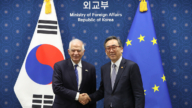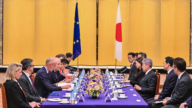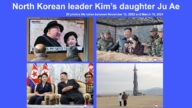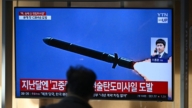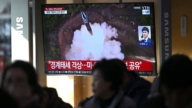【新唐人2013年06月29日訊】正在北京進行訪問的韓國總統樸槿惠和中共國家主席習近平,發表了一項聯合聲明,再次重申朝鮮半島應實現無核化的立場,雙方表示願意為此共同努力。外界評述認為,在這樣的情況下,中共和它所謂的最親密的盟友——朝鮮之間的關係,變得比以往更加複雜。下面請看詳細報導。
6月27號,中共國家主席習近平和韓國總統樸槿惠在北京舉行會談後,發表了一項題為「中韓面向未來」的聯合聲明。
韓國總統樸槿惠表示:雙方在無核化的必要性、繼續地區和平、和通過對話解決爭端的問題上達成共識。
聲明表示:雙方一致認為,核武開發,嚴重威脅了包括朝鮮半島在內的東北亞及世界和平與穩定。實現朝鮮半島無核化、保持朝鮮半島和平與穩定這一目標符合各方共同利益。中韓雙方一致同意為實現這一目標共同努力。
中共此舉是否表示因核武問題準備拋棄朝鮮,並準備和韓國站在同一立場呢?中國專家對此有不同解讀。
旅美政論家伍凡:「北京會不會把朝鮮丟掉呢?不可能。因為北京不希望韓國完全統一朝鮮半島,但是它也更不希望朝鮮用核武器攻打韓國,用武力統一朝鮮半島。所以中共現在拉韓國來抵抗北朝鮮的核武器政策。」
朝鮮,是中共一手扶植起來的「小兄弟」,金氏家族50年來始終靠中國的援助來維繫自己的權利。只是,近年來,朝鮮這個「小弟」現在把發展核武作為立國之本,不再像原來那樣聽話,這一舉動讓中共當局感到惱火。
從2006年以來,朝鮮連續三次核試爆,一次比一次當量大,遭到了聯合國包括中國在內的制裁和譴責。國際社會要求北京停止支援朝鮮的聲音日益高漲,國內民眾也要求停止給「白眼狼餵食」。
香港媒體主持人阮次山對此表示:「我們單方面的對於朝鮮六十幾億美金一年的援助,我們要考慮減半或者完全取消,讓朝鮮的金正恩感受到一巴掌的重量跟刺痛。」
畢竟,朝鮮70%的外貿交易是通過中國進行的,而90%的原油,80%的消費品和45%的食品來自中國。韓國《中央日報》指稱,過去30年間,中國向朝鮮提供了1000億美元援助。
中國國內對放棄朝鮮的呼聲漸高,但旅美政論家,美國中文雜誌《中國事務》總編輯伍凡認為,中共雖然與韓國關係變好,但也會防著韓國,因為韓國背後是美國﹔韓國也會防著朝鮮,因為朝鮮背後又是北京。這導致了「誰也離不開誰」的這麼一個三角關係。
對於中共當局來說,一邊是不聽話的朝鮮,另一邊是中國第四大貿易夥伴的韓國。這其間種種錯綜複雜的關係,也使得中、韓、朝之間的外交關係越來越複雜化。但這種「三角關係」真的會讓中共無法逼迫朝鮮放棄核計劃嗎?
時事評論員文昭:「北京是一個除了雙方有經貿上關係之外,在地區安全上,北京是唯一能夠了解朝鮮意圖的人,也是能夠對朝鮮施加影響力和約束力的人。中共對朝鮮有關鍵性的影響力,甚至是支配性力量的。支配性的力量意味著中共只要願意的話,它有足夠決心的話,它完全有能力逼迫朝鮮放棄核計劃。」
時事評論員文昭還指出,朝鮮的有核化也會導致韓國和日本的核武裝,這會使東北亞的局勢更加緊張,這也不符合中共的利益。但中共掌握著朝鮮經濟命脈,對它有決定性的制裁作用。
文昭認為,今年5月底,朝鮮領導人金正恩派特使崔龍海訪問北京,並給習近平帶去了親筆信,就是被制裁後的表現。
採訪/朱智善 編輯/宋風 後製/李勇
Beijing-Pyongyang – Ties Become Complicated
A joint statement was released after the talks between
S. Korea President Park Geun-hye and Xi Jinping,
President of the Chinese Communist Party (CCP).
The announcement reiterates their nuclear-free stance
towards the Korean Peninsula.
Both sides have expressed their willingness to
work together to this end.
Outside critics interpret that the current situation may
complicate ties between Beijing and Pyongyang.
On June 27, Xi Jinping and Park Geun-hye jointly
released a statement,
“China & South Korea: facing the future”.
Park Geun-hye has said that S. Korea and China have
reached a consensus on the following issues:
the necessity of denuclearization, regional peace,
and the resolving of disputes through dialogue.
The joint statement states that both sides have agreed
that nuclear weapon development has seriously threatened
peace and stability in Northeast Asia and the world.
The goal of denuclearization and maintaining peace
and stability on the Korean peninsula is in the common interests of all parties.
And China and South Korea will, in full accord,
work together to achieve this goal.
Does this mean that the CCP, on the nuclear issue, is now
ready to abandon Pyongyang and join hands with S. Korea?
Experts on China issues give their interpretations.
(Political commentator, USA) Wu Fan:
“Is Beijing going to discard N. Korea? That’s not possible.
Beijing doesn’t actually want to see
a reunification of the Korean Peninsula.
And neither does it expect N. Korea to launch
a nuclear attack on S. Korea.
So now, the CCP actually pulls S. Korea aside, to
resist, together, Pyongyang’s nuclear arms program.”
North Korea has long been known as
the CCP’s “little brother”.
Over the past 50 years, the Kim family has kept
its ruling status with the aid of the CCP.
In recent years, however, the “little brother”
has not followed the CCP’s advice obediently.
It has even prioritized nuclear development,
this has really annoyed the CCP.
Since 2006, Pyongyang has launched three nuclear tests.
The moves encountered heavy criticism from
the international community, as well as sanctions.
Calls on CCP authorities to stop aiding Pyongyang
have risen in the world and in China.
Hong Kong media anchor, Anthony Yuen, has said
that “Each year, we unilaterally offer aid to N. Korea,
worth in excess of 6 billion dollars.
We’d better consider halving it or cancelling it altogether,
so Kim Jong-un may taste the pain of a sharp shock.”
70% of N. Korean foreign trade comes from
transactions with China.
China is also the supplier for N. Korea’s crude oil (90%),
consumer goods (80%), and foodstuffs (45%).
According to S. Korea’s Joong Ang Ilbo newspaper,
Pyongyang has received 100-billion-dollars in aid from China over the past 30 years.
China’s domestic calls for discarding Pyongyang
have been growing.
Critic Wu Fan says that the CCP has warmed up
its relations with S. Korea, but is still wary of this neighbor.
This is because behind S. Korea stands the USA.
Whilst S. Korea is watching out for Pyongyang, too,
as the CCP is the North’s patron.
Wu Fan concludes that these factors have formed
a triangular relationship between these nations.
On one side, CCP authorities are facing
disobedient N. Korea.
On the other side is S. Korea, China’s
fourth largest trading partner.
The complex relationship has complicated
diplomatic ties among the three parties concerned.
Yet, is this “triangle” a real factor that has
disabled the CCP,
in seeking to force Pyongyang to give up its
nuclear arms program?
(Critic) Wen Zhao: “Beijing is the only party that really
understands Pyongyang’s intent, in terms of regional security.
Also, Beijing can exert a key influence over N. Korea
and can even dominate its ruler.
In other words, the CCP authorities are fully capable of
forcing Pyongyang to give up its nuclear program.”
Wen Zhao has noted that N. Korea’s nuclear threat
may force Japan and South Korea to go nuclear.
This will fuel tensions in Northeast Asia,
which is not in the CCP’s interests.
Wen Zhao says that Pyongyang’s economy
is known to be under the CCP’s thumb.
So the CCP has the capability of wielding
decisive influence over N. Korea.
In May, Kim Jong-un sent his special envoy, Cui Longhai,
to Beijing, who conveyed Kim’s personal letter to Xi Jinping.
Wen Zhao says this illustrates Pyongyang’s reaction
to the new round of sanctions.





